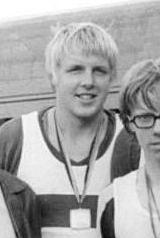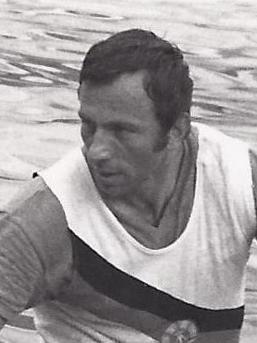Anke Borchmann is a rower who competed for East Germany in the 1970s.
Jana Sorgers is a German rower who was a dominant sculler of her time, starting her career for the East German rowing team and continuing after the German reunification for the combined Germany for a few more years. Between 1986 and 1996, she won two Olympic gold medals, seven world championship titles, and nine national titles. Upon the conclusion of her successful career, she was awarded the Thomas Keller Medal by the International Rowing Federation (FISA) – the highest honour in rowing.
Ursula Unger is a rower who competed for East Germany during the 1970s.

Siegfried Brietzke is a German rower. He competed for East Germany, first in coxless pairs, together with Wolfgang Mager, and then in coxless fours. In these events he won Olympic gold medals in 1972, 1976 and 1980, as well as four world championships in 1974–1979.
Andrea Kurth is a German rower who competed for East Germany in the 1976 Summer Olympics.
Roswietha Zobelt is a German rower who competed for East Germany in the 1976 Summer Olympics and in the 1980 Summer Olympics.
Hartmut Wenzel was a German coxswain. He defected from East Germany during his rowing career in 1971, later winning Olympic bronze for West Germany.

Rosemarie Lorenz is a retired East German rower. Under her maiden name, she won a silver and a gold medal in the eight event at the European championships of 1967 and 1968, respectively. Under her married name, she won a gold in the eight event at the 1969 European Rowing Championships in Klagenfurt.

Götz Draeger, sometimes incorrectly referred to as Dräger, is a German rower.
Stefan Weiße was a German rower. He was quad scull world champion for East Germany in 1975.
Christof Kreuziger is a German rower. He won gold medals for East Germany at the 1973 European Rowing Championships and the 1974 World Rowing Championships in double scull, and at the 1975 World Rowing Championships in quad scull.
Bernd Kaiser is a German coxswain. He was the cox of the East German eight that became world champion in 1978.
Andreas Ebert is a rower who competed for East Germany. He was world champion in the eight event in 1978.
Bernd Frieberg is a rower who competed for East Germany.
Marion Rohs is a rower who competed for East Germany in the 1970s.
Bärbel Bendiks is a rower who competed for East Germany in the 1970s and early 1980s.
Katja Rothe is a rower who competed for East Germany in the 1970s.
Gisela Medefindt is a German rower.
Christine Röpke is a rower who competed for East Germany during the 1970s.
Barbara Müller, is a rower who represented East Germany in the 1960s. She was later a rowing coach for SG Dynamo Potsdam.


